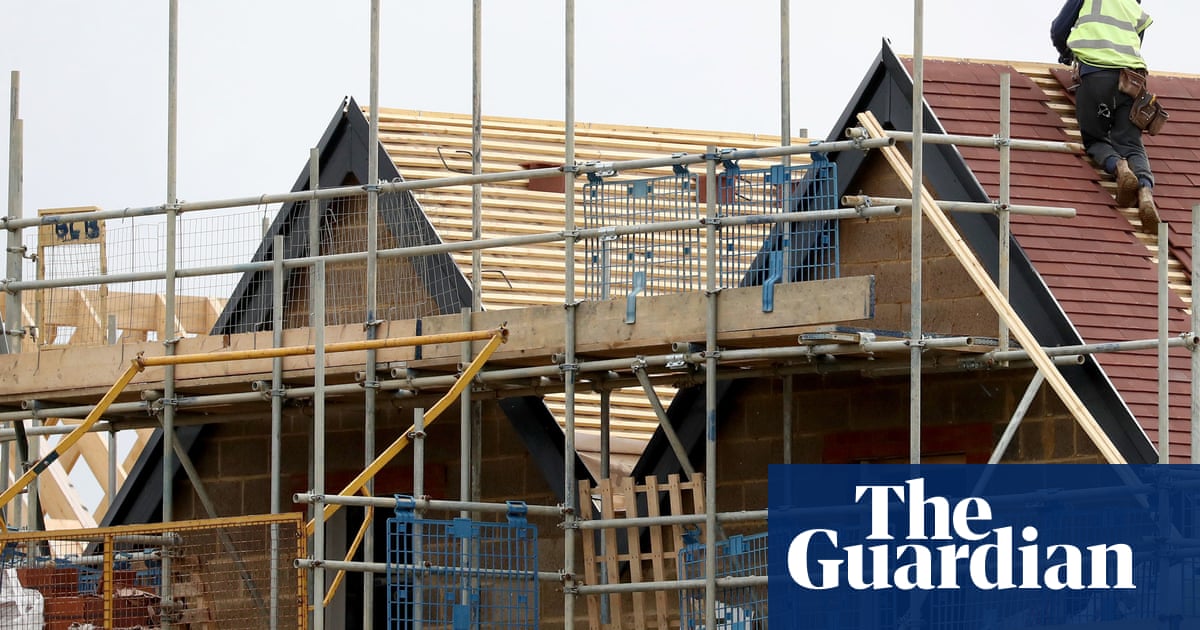The head of one of the UK’s biggest non-profit housing providers has called for social housing to be classed as “critical national infrastructure”, like roads and energy networks, allowing for billions of pounds in much needed extra investment.
In an interview with the Guardian, the chair of housing association Peabody, Ian McDermott, said it should be reclassified by the Treasury to allow chancellor,Rachel Reeves, to commit extra funds without breaking her fiscal rules.
His intervention comes as 11 of the country’s major providers wrote in a letter to housing minister Matthew Pennycook ahead of next month’s spending review that the government had inherited “the worst housing situation in living memory”.
The housing secretary,Angela Rayner, is said to be fighting for a larger settlement in the spending review, planned for 11 June, amid dissatisfaction over funding for affordable and social housing.
McDermott warned that 90% of current spending on social housing was on subsidies and temporary accommodation, rather than bricks and mortar, the reverse of what had been the case in the 1970s.
“For too long, social housing has been seen as a subsidy and a cost rather than an asset and critical national infrastructure for the country,” he said.
There are 14 areas of national life currently listed as critical infrastructure, including defence, data, energy, food, health and transport – but not housing. If housing was included, it would make it easier for spending on it to be excluded from normal fiscal rules, as it would be categorised as investment in infrastructure and would not count against government debt.
The letter from London-based associations including L&Q, Peabody, ClarionHousingand Notting Hill Genesis said: “It is important to be honest about the scale of the problems and the solutions needed. You have inherited the worst housing situation in living memory. There is a housing emergency, with London at the epicentre, and new supply in the capital has already fallen off a cliff.”
It said that there were more households in London on a social housing waiting list than double the entire population of Cambridge.
The temporary housing crisis and its effects on people’s lives was “almost impossible to articulate”, the letter said, warning it was costing councils in London alone almost £4m a day. But it said changes to government rent policy since 2016 had taken almost £6.6bn out of the sector, which could have been invested in new and improved homes.
“By the end of the parliament affordable housing completions will have fallen to the lowest levels since the second world war without urgent and specific interventions for London,” it said.
Shelter and National Housing Federation have suggested about 90,000 social homes a year would be needed to hit the government’s manifesto target of 1.5m new homes, at a cost of about £11.8bn each year. But the investment is estimated to support almost 140,000 jobs and generate significantly higher economic output, breaking even within three years.
McDermott, who takes over chairing the G15 group of London’s leading housing associations from June, said the 1.5m homes target was “very stretching” but the sector could play its part in achieving it.
“We own land that could potentially build 20,000 homes. Can we build it? Yes, we can. It is definitely possible. There is an issue about workforce and about skills. But can we bring about that generational change? Yeah, we can,” he said. “But we need the government to be sympathetic and supportive of our asks.”
McDermott said the economic case for investment in housing was “unarguable”.
Sign up toFirst Edition
Our morning email breaks down the key stories of the day, telling you what’s happening and why it matters
after newsletter promotion
“The social case is unarguable. It’s national infrastructure because if you look at what makes contented, thriving communities, at the core of those things is decent housing. And unless you recognise it as an essential element to a productive Britain and a thriving Britain and a contented Britain, then actually you’re going to miss the point.”
The housing ombudsman recently warned of a“simmering angerat poor housing conditions” which he said could boil over into social tension, with a 474% increase in complaints about substandard living conditions since 2019/20.
Richard Blakeway said it was “neither fanciful nor alarmist” to suggest the growing anger at housing conditions could become “social disquiet”, saying the “shock ofGrenfell TowerandAwaab Ishak’s deathresonate still”. He said there had been a “really serious fracturing of trust, which in some cases is irreparable,” with housing providers.
McDermott said that he understood the anger and that the sector had to do better, but said it was wrong to say providers did not care. “England has some of the oldest housing in Europe and the ombudsman is right to say that our not-for-profit sector is under intense pressure. Looking after residents’ homes well is our top priority and needs to be funded through rental income,” he said.
“This is heavily regulated and was subject to government-imposed cuts for five out of seven years, which eroded our capacity to invest. As a sector, we’re catching up but with inflation and the cost of living crisis it has been a perfect storm.”
Ministers are facing increased pressure to unlock more funds for housing in the runup to next month’s spending review. In a speech at an event in London on Saturday, Andy Burnham, theLabourmayor of Greater Manchester, was to call for a timetable by which time more new social homes were being built than sold off, calling housing “the single biggest cause of Britain’s modern malaise”.
A spokesperson for the Ministry of Housing, Communities and Local Government said: “We’ve taken immediate action fix the housing crisis we’ve inherited and kickstart the biggest expansion to social and affordable housing in a generation. This included, they said,£800m for affordable homes, and changes to right to buy, with a proposal for a long-term rent deal for social home providers to provide certainty on income.
